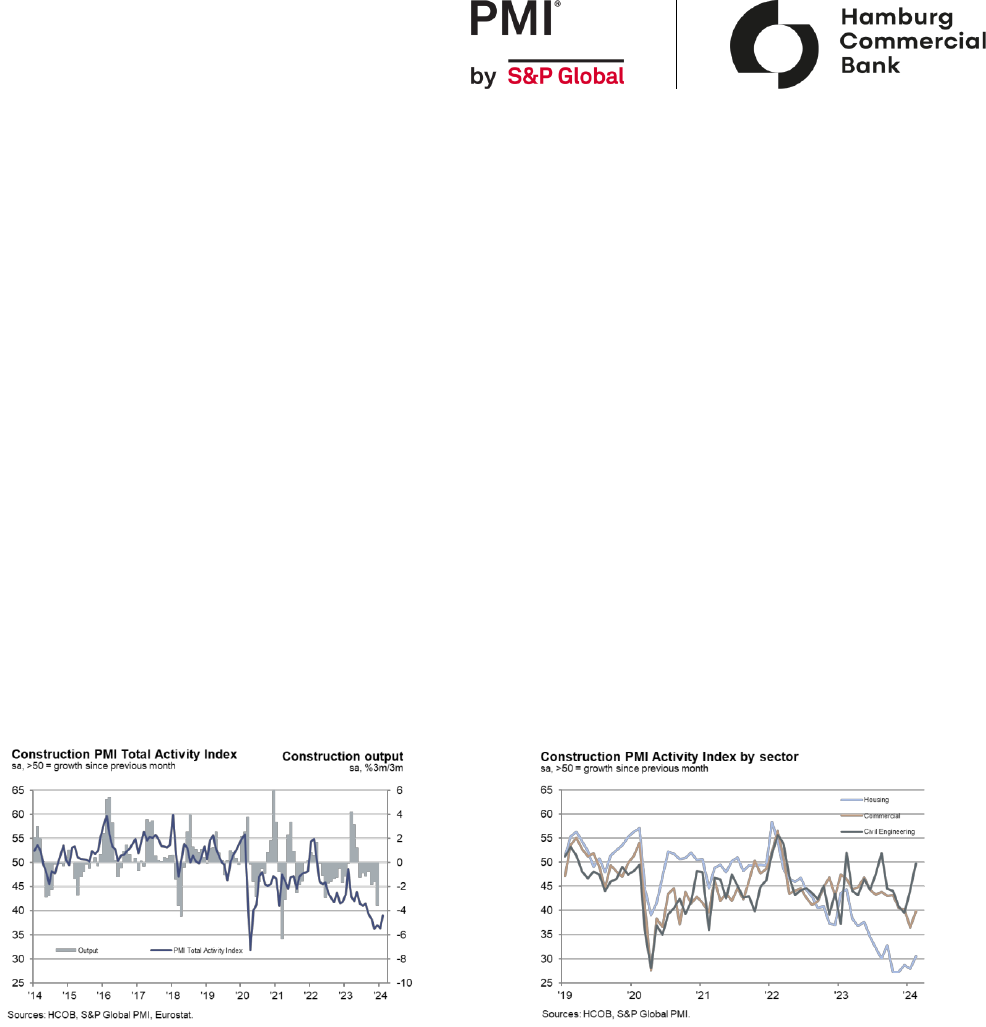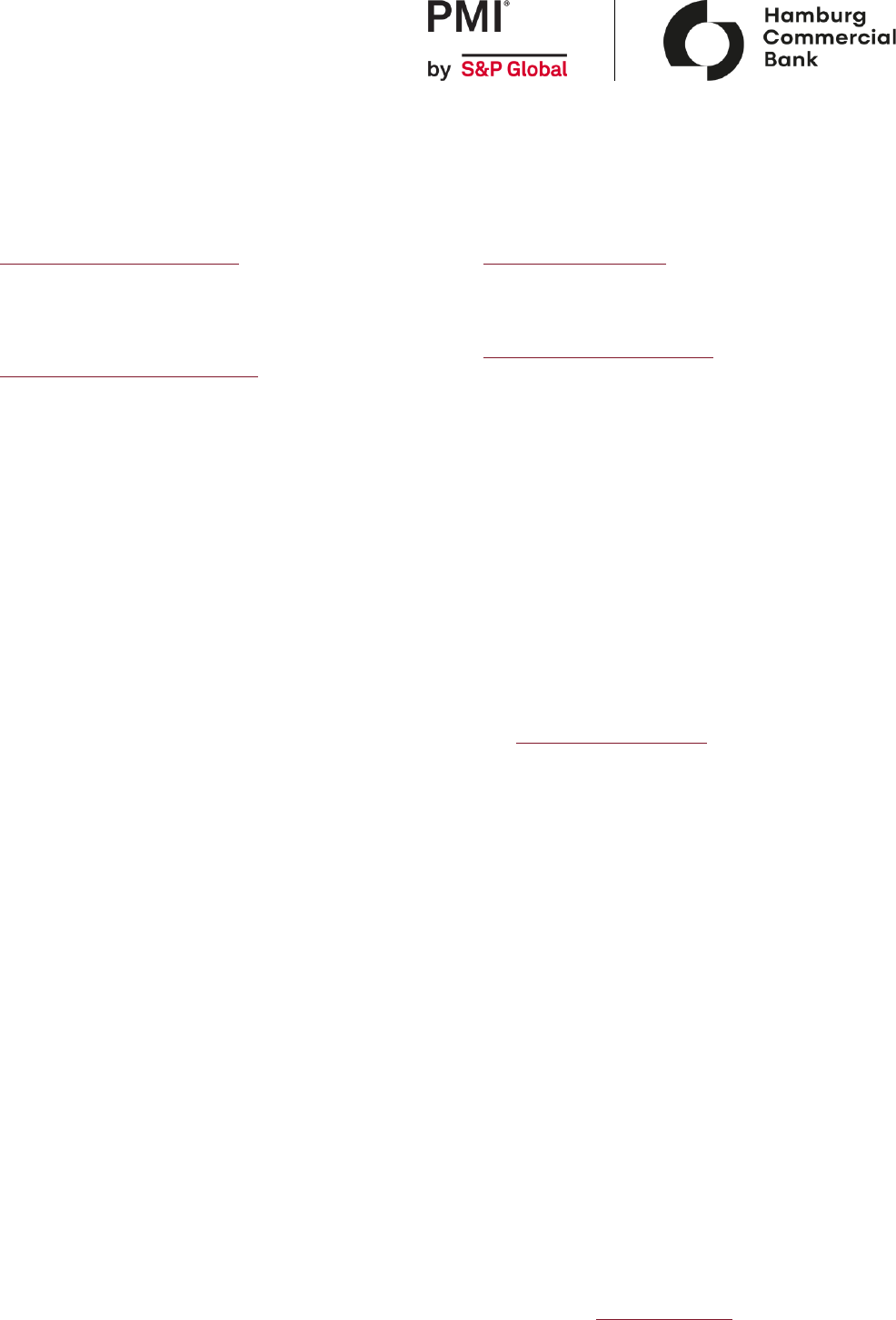
Copyright © 2024 S&P Global
NEWS RELEASE
MARKET SENSITIVE INFORMATION
Embargoed until 0930 CET (0830 UTC) 6 March 2024
HCOB Germany Construction PMI
®
Decline in construction activity eases in February
Key findings:
Total industry activity falls at slowest rate for five months
Downturns soften in each broad sector, but particularly in civil engineering
Input cost inflation at 11-month high as delivery times lengthen
Data were collected 12-28 February 2024.
The German construction sector remained firmly in contraction territory midway through the opening quarter of the year,
although rates of decline in activity, new orders and employment all eased, the latest HCOB PMI
®
survey compiled by S&P
Global showed. The slower fall in total industry activity partly reflected a near-stabilisation in civil engineering work.
Input prices meanwhile rose for the third month running, with the rate of cost inflation hitting the highest for nearly a year but
remaining low by historical standards. The rise in purchasing costs coincided with a second successive monthly lengthening of
supplier delivery times and belied a sustained downturn in demand for building materials.
The HCOB Germany Construction PMI Total Activity Index – a seasonally adjusted index tracking changes in total industry
activity – ticked up to a five-month high of 39.1 in February, from January’s 36.3. Nevertheless, the latest reading was still well
below the critical 50.0 no-change mark and shy of its average over the current sequence of decline that stretches back to April
2022.
February data showed slower rates of decline in each of the three broad construction categories monitored by the survey. Civil
engineering activity in fact fell only factionally, its rate of decrease having slowed notably since January. Rates of contraction in
both housing and commercial activity remained sharp, particularly that of the former, but they eased to the weakest since last
September and December, respectively.
Activity in the construction sector continued to be dragged down by a lack of new work. Panellists cited ongoing headwinds to
demand from client uncertainty, price pressures and general weakness in the economy. New orders once again fell at a sharp
rate, but one that was nevertheless the least marked for six months.
The pace of job shedding likewise moderated across the construction sector in February, showing the smallest drop in
employment since last July. Still, the decline in workforce numbers continued a trend of shrinking staffing capacity stretching
back almost two years. Subcontractor usage also fell, contributing to an improvement in their availability. However, February
saw a renewed – albeit marginal - rise in rates charged by subcontractors following a four-month sequence of decline.
Average input prices faced by constructors also increased in February, the third month in a row in which this has been the case.
The rate of cost inflation crept up to its highest since March 2023, although it was still subdued by historical standards. There
were some mentions of supply bottlenecks and shipping delays driving up costs, alongside the pass-through of increased toll
charges and high inflation generally. Supplier delivery times lengthened again in February, in a reversal of the trend seen
throughout most of 2023. That was despite a continued decline in demand for building materials and products.
Looking ahead, German constructors remained downbeat about the outlook for activity over the coming year, citing economic
frailty and domestic politics as potential constraints. Whilst expectations improved slightly to the highest since last April,
pessimists continued to far outnumber optimists.

Copyright © 2024 S&P Global
Comment
Commenting on the PMI data, Dr. Cyrus de la Rubia, Chief Economist at Hamburg Commercial Bank, said:
“These numbers continue to paint an ugly picture. True, the PMI has gone up by almost 3 points which is not negligible.
However, the index remains still deep in recessionary territory and it is only a one-month movement for now.
“Housing remains the main driver of the recession in construction, followed by commercial real estate activity. A silver lining
comes from civil engineering as activity has remained more or less the same as in January, instead of continuing its hefty fall
of the previous five months.
“Growth territory remains far away. This is best indicated by new orders which have been shrinking at a fast pace for two
years running. The fall softened a bit over the last three months. But this means only that the deepening of the crisis has lost
some momentum, while the crisis is far from over.
“One thing that does complicate the longed-for recovery is the fact that input prices are on the increase again for three
months straight. Subcontractor rates rose in February for the first time in five months. This means that construction
companies are not only suffering from the high interest rate level but also from increasing costs. Given the weak economy, it
is difficult to build residential units that are both attractive for the builder and affordable to the people.
“The assessment about future activity has been negative almost continuously since the start of Covid-19 in 2020. It is as if
pessimism has almost entered into the DNA of the construction sector. However, we know that better times will eventually
come back. Just as an example, during 2016 to 2019, construction businesses were much more positive on the future. What
could possibly trigger a change for the better? Lower interest rates are certainly one ingredient as well as a general
economic recovery. Interest rate cuts, though probably not too many, are around the corner and we are convinced that the
recession will be over soon.”
-Ends-

Copyright © 2024 S&P Global
Contact
Hamburg Commercial Bank AG S&P Global Market Intelligence
Dr. Cyrus de la Rubia
Chief Economist
T: +49-160-9018-0792
cyrus.delarubia@hcob-bank.com
Katrin Steinbacher
Head of Press Office
Senior Vice President
T: +49-40-3333-11130
Phil Smith
Economics Associate Director
T: +44-1491-461-009
Sabrina Mayeen
Corporate Communications
T: +44-796-744-7030
Note to Editors
The HCOB Germany Construction PMI
®
is compiled by S&P Global from responses to questionnaires sent to a panel of
around 150 construction companies. The panel is stratified by company workforce size, based on contributions to GDP.
Survey data were first collected September 1999.
Survey responses are collected in the second half of each month and indicate the direction of change compared to the
previous month. A diffusion index is calculated for each survey variable. The index is the sum of the percentage of ‘higher’
responses and half the percentage of ‘unchanged’ responses. The indices vary between 0 and 100, with a reading above 50
indicating an overall increase compared to the previous month, and below 50 an overall decrease. The indices are then
seasonally adjusted.
The headline figure is the Total Activity Index. This is a diffusion index that tracks changes in the total volume of construction
activity compared with one month previously. The Total Activity Index is comparable to the Manufacturing Output Index and
Services Business Activity Index. It may be referred to as the ‘Construction PMI’ but is not comparable with the headline
manufacturing PMI figure.
Underlying survey data are not revised after publication, but seasonal adjustment factors may be revised from time to time
as appropriate which will affect the seasonally adjusted data series.
For further information on the PMI survey methodology, please contact [email protected].
Hamburg Commercial Bank AG
Hamburg Commercial Bank (HCOB) is a private commercial bank and specialist financier headquartered in Hamburg,
Germany. The bank offers its clients a high level of structuring expertise in the financing of commercial real estate projects
with a focus on Germany as well as neighboring European countries. It also has a strong market position in international
shipping. The bank is one of the pioneers in European-wide project financing for renewable energies and is also involved in
the expansion of digital and other areas of important infrastructure. HCOB offers individual financing solutions for
international corporate clients as well as a focused corporate client business in Germany. The bank’s portfolio is completed
by digital products and services facilitating reliable, timely domestic and international payment transactions as well as for
trade finance.
Hamburg Commercial Bank aligns its activities with established ESG (Environment, Social, and Governance) criteria and
has anchored sustainability aspects in its business model. It supports its clients in their transition to a more sustainable
future.
The bank’s specialists are as experienced as they are pragmatic. They act in a reliable manner and at eye level with their
customers. They provide in-depth advice in order to jointly find efficient solutions that are a perfect fit – for complex projects
in particular. Tailor-made financing, a high level of structuring and syndication expertise and many years of experience are
just as much a hallmark of the bank as are our profound market and sector expertise.
S&P Global (NYSE: SPGI)
S&P Global provides essential intelligence. We enable governments, businesses and individuals with the right data,
expertise and connected technology so that they can make decisions with conviction. From helping our customers assess
new investments to guiding them through ESG and energy transition across supply chains, we unlock new opportunities,
solve challenges and accelerate progress for the world.
We are widely sought after by many of the world’s leading organizations to provide credit ratings, benchmarks, analytics and
workflow solutions in the global capital, commodity and automotive markets. With every one of our offerings, we help the
world’s leading organizations plan for tomorrow, today.
S&P Global is a registered trademark of S&P Global Ltd. and/or its affiliates. All other company and product names may be
trademarks of their respective owners © 2024 S&P Global Ltd. All rights reserved. www.spglobal.com

Copyright © 2024 S&P Global
About PMI
Purchasing Managers’ Index™ (PMI
®
) surveys are now available for over 40 countries and also for key regions including the
eurozone. They are the most closely-watched business surveys in the world, favoured by central banks, financial markets
and business decision makers for their ability to provide up-to-date, accurate and often unique monthly indicators of
economic trends. www.spglobal.com/marketintelligence/en/mi/products/pmi.html
If you prefer not to receive news releases from S&P Global, please email katherine.smith@spglobal.com. To read our
privacy policy, click here.
Disclaimer
The intellectual property rights to the data provided herein are owned by or licensed to S&P Global and/or its affiliates. Any
unauthorised use, including but not limited to copying, distributing, transmitting or otherwise of any data appearing is not
permitted without S&P Global’s prior consent. S&P Global shall not have any liability, duty or obligation for or relating to the
content or information (“Data”) contained herein, any errors, inaccuracies, omissions or delays in the Data, or for any actions
taken in reliance thereon. In no event shall S&P Global be liable for any special, incidental, or consequential damages,
arising out of the use of the Data. Purchasing Managers’ Index™ and PMI
®
are either trade marks or registered trade marks
of S&P Global Inc or licensed to S&P Global Inc and/or its affiliates.
This Content was published by S&P Global Market Intelligence and not by S&P Global Ratings, which is a separately
managed division of S&P Global. Reproduction of any information, data or material, including ratings (“Content”) in any form
is prohibited except with the prior written permission of the relevant party. Such party, its affiliates and suppliers (“Content
Providers”) do not guarantee the accuracy, adequacy, completeness, timeliness or availability of any Content and are not
responsible for any errors or omissions (negligent or otherwise), regardless of the cause, or for the results obtained from the
use of such Content. In no event shall Content Providers be liable for any damages, costs, expenses, legal fees, or losses
(including lost income or lost profit and opportunity costs) in connection with any use of the Content.
